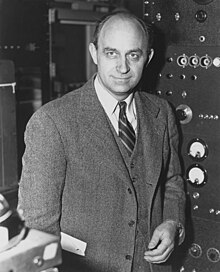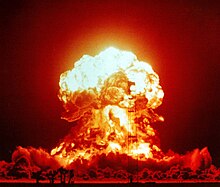Enrico Fermi

Enrico Fermi (29 September 1901 – 28 November 1954) was an Italian and naturalized American physicist, renowned for being the creator of the world's first artificial nuclear reactor, the Chicago Pile-1, and a member of the Manhattan Project. He has been called the "architect of the nuclear age" and the "architect of the atomic bomb". He was one of very few physicists to excel in both theoretical physics and experimental physics. Fermi was awarded the 1938 Nobel Prize in Physics for his work on induced radioactivity by neutron bombardment and for the discovery of transuranium elements. With his colleagues, Fermi filed several patents related to the use of nuclear power, all of which were taken over by the US government. He made significant contributions to the development of statistical mechanics, quantum theory, and nuclear and particle physics.
Quotes
[edit]
- Although the problem of transmuting chemical elements into each other is much older than a satisfactory definition of the very concept of chemical element, it is well known that the first and most important step towards its solution was made only nineteen years ago by the late Lord Rutherford, who started the method of the nuclear bombardments.
- Nobel lecture (12 December 1938)

- Such a weapon goes far beyond any military objective and enters the range of very great natural catastrophes. By its very nature it cannot be confined to a military objective but becomes a weapon which in practical effect is almost one of genocide. It is clear that the use of such a weapon cannot be justified on any ethical ground which gives a human being a certain individuality and dignity even if he happens to be a resident of an enemy country... The fact that no limits exist to the destructiveness of this weapon makes its very existence and the knowledge of its construction a danger to humanity as a whole. It is necessarily an evil thing considered in any light.
- On the Hydrogen bomb in a minority annex (co-authored with I. I. Rabi) to an official General Advisory Committee report for the Atomic Energy Commission (30 October 1949)
- Where are they?
- Variant: Where is everybody? : The Fermi paradox spoken in 1950 regarding the lack of evidence of extra-terrestrial intelligence. As quoted in "Where are They? Maybe we are alone in the galaxy after all" by Ian Crawford in Scientific American (July 2000), p. 38-43 (PDF document); also in "Our Galaxy Should Be Teeming With Civilizations, But Where Are They?" by Seth Shostak at Space.com (25 October 2001)
- I cannot think of a single one, not even intelligence.
- When asked what characteristics Nobel prize winning physicists had in common. As quoted in Physics Today (October 1994), p. 70.
- I hope it won't take long.
- Comment to Eugene Wigner, ten days before his death from cancer, as quoted in The collected works of Eugene Paul Wigner (1992), p. 108
- If I could remember the names of all these particles, I'd be a botanist.
- As quoted in Hyperspace (1995) by Michio Kaku
- There are two possible outcomes: if the result confirms the hypothesis, then you've made a measurement. If the result is contrary to the hypothesis, then you've made a discovery.
- As quoted in Nuclear Principles in Engineering (2005) by Tatjana Jevremovic, p. 397
Quotes about Fermi
[edit]
- Some recent work by E. Fermi and L. Szilard, which has been communicated to me in manuscript, leads me to expect that the element uranium may be turned into a new and important source of energy in the immediate future. Certain aspects of the situation seem to call for watchfulness and, if necessary, quick action on the part of the Administration...
- Albert Einstein, in the famous letter to President Franklin D. Roosevelt which prompted attention to what eventually became the Manhattan Project. (1939-08-02; delivered 1939-10-11)
- He was simply unable to let things be foggy. Since they always are, this kept him pretty active.
- MAJORANA: There are scientists who 'happen' only once in every 500 years, like Archimedes or Newton. And there are scientists who happen only once or twice in a century, like Einstein or Bohr. FERMI: But where do I come in, Majorana? MAJORANA: Be reasonable, Enrico! I am not talking about you or me. I am talking about Einstein and Bohr.
- Ettore Majorana. Reported in Chandrasekhar, Subramanyan. "The pursuit of science." Minerva (1984): 410-420.
- As astronomer Carl Sagan thought about what Fermi said [Fermi paradox], he began to be alarmed. ...This could only mean that advanced civilizations destroy themselves before they get that far, a viewpoint Sagan published in 1966.
- Stanley A. Rice, Life of Earth: Portrait of a Beautiful, Middle-aged Stressed-out World (2011) Referencing Intelligent Life in the Universe by Iosif S. Shklovsky and Carl Sagan
- If Fermi had been born a few years earlier, one could well imagine him discovering Rutherford's atomic nucleus, and then developing Bohr's theory of the hydrogen atom. If this sounds like hyperbole, anything about Fermi is likely to sound like hyperbole.
- There is no democracy in physics. We can't say that some second-rate guy has as much right to opinion as Fermi.
- Luis Alvarez, in Greenberg, The Politics of Pure Science, 1967, p. 43
See also
[edit]External links
[edit]- Brief biography at the official site of the Nobel Foundation.
- Brief biography at FermiLab
- The Time 100
- The American Experience (PBS)


